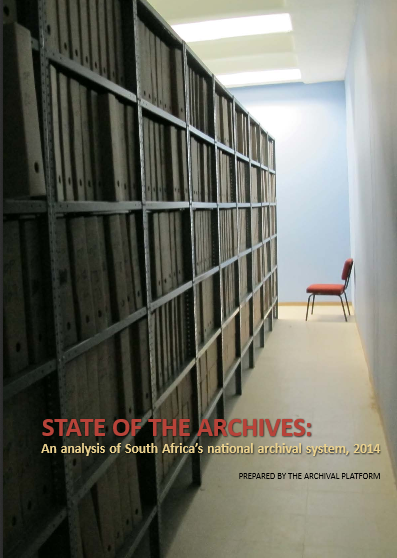
State of the Archives: An Analysis of South Africa’s National Archival System, 2014
Download the full Report here.
Executive Summary
South Africa’s national archival system was conceptualised in the early 1990s, the product of a vibrant transformation discourse not unrelated to the negotiation process which was changing South Africa’s political landscape so dramatically. Broad consultative processes convened from 1994 by the new state culminated in the 1996 Constitution and the National Archives of South Africa Act No 43 of 1996 providing the framework for the establishment of the system. By the end of Nelson Mandela’s presidency, most of the system’s building blocks had been put in place and it was beginning to take shape around five key objectives:
- Turning archives into an accessible public resource in support of the exercise of rights.
- Using archives in support of post-apartheid programmes of redress and reparation, such as the Truth and Reconciliation Commission, land restitution and special pensions.
- Taking archives to the people through imaginative and participative public programming.
- Actively documenting of the voices and the experiences of those either excluded from or marginalised in the colonial and apartheid archives.
- Transforming public archives into auditors of government record keeping in support of efficient, accountable and transparent administration.
Much good work was done systematically through the 1990s, but the hopes of that period have not been realised. Today the national archival system is in trouble. Good work is being done only in isolated pockets. There is no overarching policy framework for archives beyond that implicit in national and provincial legislation. The vision of the 1990s has evaporated. Chronic underfunding and lack of resources is ubiquitous. The political will required to change things is largely absent. The system, simply put, is not delivering. These conclusions have been reached by the Archival Platform (a joint University of Cape Town-Nelson Mandela Foundation project) on the basis of a detailed analysis undertaken over two years (2012-2014). As a stakeholder in archives, and mindful of the public interest in a dynamic, efficient and transformative national archival system, the Platform’s analysis is offered as a contribution to addressing what are fundamental challenges. The system in 2014 fares poorly when measured against the key objectives of the 1990s:
- As has been noted repeatedly by the Auditor-General (AGSA) and the South African Human Rights Commission in recent years, the state of government record keeping is embarrassing. And public archives are neither equipped, resourced nor positioned to do the records auditing and records management support they are required to by their mandates. Poor record keeping undermines service-delivery, cripples accountability, and creates environments in which corruption thrives.
- Generally public archives have been unable to transform themselves into active documenters of society, nor to fulfil their mandated role of co-ordinating and setting standards across sectors as envisaged in the 1990s. Oral history projects are common, but are both random and undertaken in modes that are profoundly problematic. The huge potential of digitisation in support of preservation and public access has not been harnessed.
- Apartheid-era patterns of archival use and accessibility have proved resilient. Archives remain the domain of elites. Public archives do very little outreach, and only a fraction of their holdings are accessible online.
- Swathes of documentary memory are being lost, especially in electronic environments. While 21st century recordkeeping is primarily electronic, public archives remain geared to paper-based realities. Numerous cases have been reported of records ‘disappearing’. And public archives continue to authorise the destruction of the vast majority (estimated at over 90%) of public records through appraisal processes without independent monitoring in the public interest.
- Ironically public access to archives has become more restricted in the era of a constitutionally protected freedom of information. The 1990s vision of ‘open democracy’, which saw archives opened in ways that had been impossible under apartheid, has been lost. The Promotion of Access to Information Act is routinely used by archives for gatekeeping. And the impending Protection of State Information Act has already fostered new cultures of secrecy within public archives and revivified that old apartheid oppressive tool – the classified record.
The Archival Platform’s analysis reveals a national archival system in trouble. After twenty years of democratisation and transformation the system reminds us of nothing so much as the 1980s State Archives Service and its ‘homelands’ subsidiaries. The recommendation is not that the system needs ‘help’. Rather, we are recommending that it needs to be reviewed fundamentally. The models which informed it – North American and European models in the main – need to be reconsidered. The Minister of Arts and Culture must meet the challenge by acting decisively to avert what could become a national disgrace.
Download the full Report here.